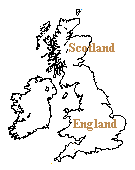
The Enlightenment in England



James I became the king of England in 1603. James did not support
the Puritans or Calvanists and made it clear that he would stand behind
the religious conservatives. James I spent extravagantly, like his
son did, Charles I. in 1628, Parliament forced Charles to sign the
Petition
of Rights, a document that stated no money could be "borrowed or raised
through taxes" without the permission of Parliament. Charles then
dissolved Parliament for twelve years. After the Scots rebelled when
England tried to impose the English Church on them, Charles had to summon
the Parliament. In 1640, the Parliament made it illegal to raise
taxes without their permission, ensured that Parliament would meet at least
once every three years, and issued the Militia Ordinance.
The Militia Ordinance put the army under the rule of Parliament.
This all led to the English Civil War which lasted from 1642 to 1646.
The Parliamentary Army, led by Oliver Cromwell, fought against the Royal
Army in 1645. Charles I surrendered one year later however, he did
not lose his title. Charles was later arrested and publicly executed
by Parliament.
Oliver Cromwell held power and dissolved Parliament in 1653. He established
a Puritan Republic. Cromwell had literally become England's monarch.
He conquered Ireland and Scotland, creating Great Britain. In 1658,
Oliver Cromwell died and was replaced by his inadequate son. Parliament
reconvened in 1660, restored the king and restored the Anglican Church.
Charles II, son of Charles I, ruled England from 1660 to 1685. In
1672, Charles II issued the Declaration of Indulgence, a document
that gave religious freedom to Catholics and Protestants. Parliament
then passed the Test Act that prevented the Catholic brother of
Charles, James II, from inheriting the throne.
However, upon the death of Charles II in 1685, James did come to power.
James tried to instill religious toleration in the English government,
but failed. Parliament then asked William of Orange and his wife
Mary, the sister of James, to invade England and rule because they were
Protestant. James II quickly fled to France. This was called
the "Glorious Revolution" because it was a bloodless one. Parliament
then created a Bill of Rights that limited the power of the monarchy.
